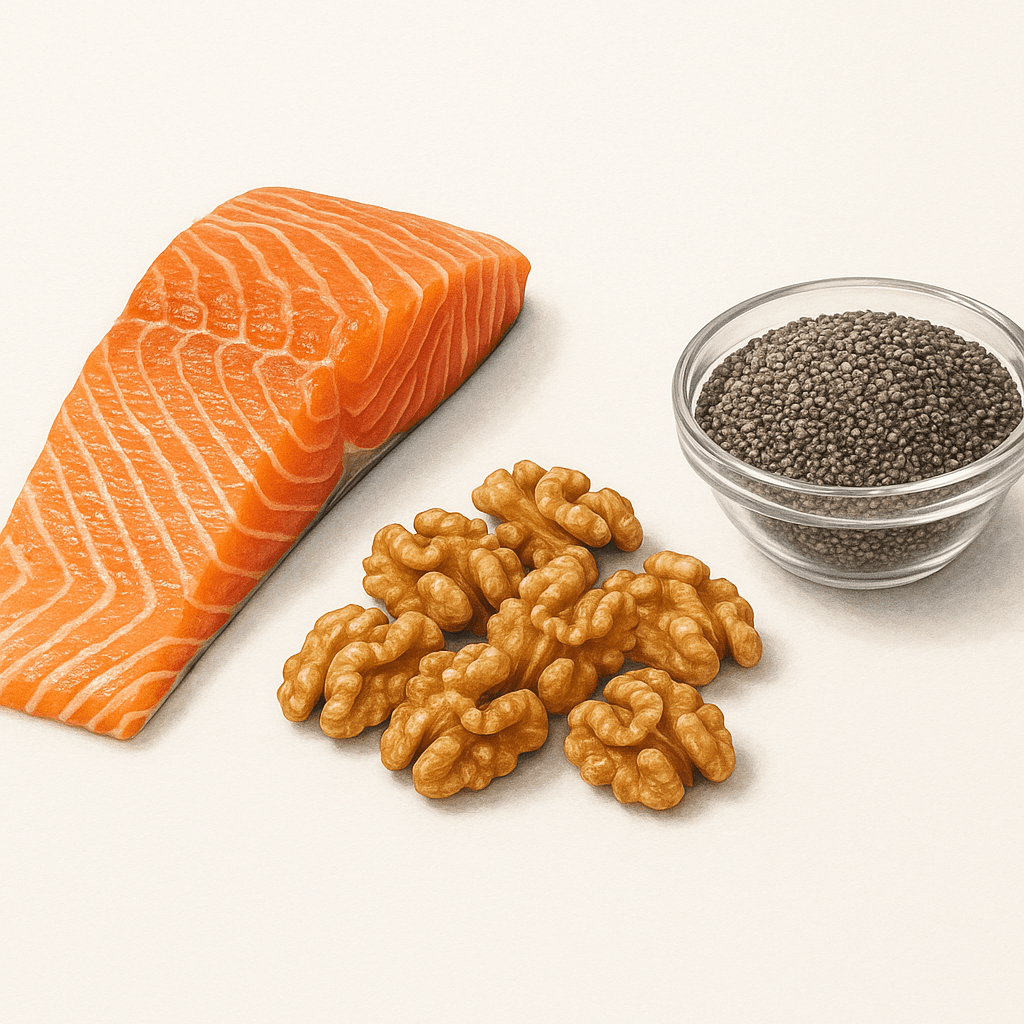Omega-3 fatty acids are vital substances that our body cannot produce on its own, but they are essential for maintaining optimal health.
These essential fatty acids are involved in a wide range of bodily functions, from supporting the cardiovascular system to improving brain function. The benefits of omega-3 are widely recognized by research and health professionals around the world. If you are interested in the general topic of boosting immunity, we recommend that you read our review of natural vitamins that boost immunity.
In this comprehensive article, you will learn what omega-3 fatty acids are, what benefits they provide to various body systems, what are their main sources in the diet, and how to choose the right supplements.
We will also discuss recommended doses for different age groups and important safety considerations.
What are omega-3 fatty acids? Types and biological role
Omega-3 fatty acids belong to the group of polyunsaturated fatty acids that are essential for our body, but the body cannot synthesize them itself. For this reason, they are called essential (essential) fatty acids and must be obtained from food or supplements.
The main types of omega-3 fatty acids are:
- ALA (alpha-linolenic acid) – found in plant sources such as flaxseed, chia seeds and walnuts.
- EPA (eicosapentaenoic acid) – found mainly in seafood, especially oily fish.
- DHA (docosahexaenoic acid) – also derived from seafood and is particularly important for brain and retinal function.
These fatty acids differ not only in their sources but also in their biological roles. ALA is a shorter-chain omega-3 that the body can convert to EPA and DHA, but this process is not very efficient – only about 5-10% of ALA is converted to EPA, and an even smaller part to DHA. As a result, direct consumption of EPA and DHA from animal sources or supplements is often recommended for optimal effects.
The biological role of omega-3 fatty acids is broad and fundamental. They are structural components of cell membranes, participate in inflammatory processes, blood clotting, vascular function and neurotransmitter activity. Omega-3 fatty acids affect gene expression, help regulate hormone production and are essential for the normal function of various organs, including the brain, heart, eyes and immune system.
Omega-3 benefits for the human body
The benefits of omega 3 cover many important systems and functions of the body. Scientific studies confirm various positive health effects. Let’s take a look at the main benefits of omega-3 fatty acids in detail.
For heart health
- DHA and EPA help maintain normal heart function
For brain function and vision
- DHA supports normal brain function
- DHA contributes to the maintenance of normal vision
Main sources of omega-3 fatty acids in the diet
Omega-3 sources in the diet can be divided into animal and plant sources. Proper inclusion of these foods in the daily diet is an easy way to ensure sufficient levels of omega-3 fatty acids in the body.
Animal sources of omega-3 (EPA and DHA)
Seafood is the richest source of EPA and DHA:
- Salmon – a 100 g serving provides about 2-3 g of omega-3
- Mackerel – a particularly rich source, 100 g contains about 2.5 g of omega-3
- Herring – a traditional product of the Baltic States, 100 g contains about 1.7 g of omega-3
- Sardines – not only a source of omega-3, but also calcium due to the edible bones
- Oysters – have a lower fat content, but are still a good source of omega-3
- Trout – fresh and often available in Lithuanian stores
- Cod liver oil – a concentrated source of omega-3, traditionally used in Northern Europe
It is recommended to eat oily fish at least 2 times a week to ensure sufficient levels of EPA and DHA.
Plant-based sources of omega-3 (ALA)
Plant-based products are excellent sources of alpha-linolenic acid (ALA):
- Flaxseeds – one of the richest sources of ALA (about 7 g of omega-3 per 100 g)
- Chia seeds – contain about 5 g of omega-3 per 100 g of seeds
- Walnuts – not only omega-3, but also a source of antioxidants
- Hemp seeds – a balanced source of omega-3 and omega-6
- Soybeans – moderate ALA content, but a useful source of protein
- Rapeseed oil – the oil with the best omega-3 to omega-6 ratio
It is especially important for vegetarians and vegans to consume a variety of plant-based sources of omega-3 or supplement their diet with specialized algae supplements, since the conversion of ALA to EPA and DHA in the body is limited.
Practical tips for integrating omega-3 into your daily diet
- Include flaxseed in your morning porridge or yoghurt
- Use canola oil for salads and cooking
- Choose walnuts or chia-filled desserts for snacks
- Regularly include fish in your meals
Prepare herbal infusions with flaxseed oil
Heart health often starts with nutrition – learn more about products that support the cardiovascular system in our special review.
Omega-3 supplements – how to choose the right ones
Omega 3 supplements can be a great solution for those who do not get enough of these valuable fatty acids from their diet.
However, there are many different products on the market, so it is important to know how to choose a quality and effective supplement.
Types of Omega-3 Supplements
- Fish oil – the traditional and most widely used source of omega-3, containing both EPA and DHA
- Krill oil – a better absorbed form, contains the natural antioxidant astaxanthin
- Cod liver oil – contains not only omega-3, but also vitamins A and D
- Algal oil – a plant-based source of DHA, suitable for vegetarians and vegans
- Flaxseed oil – a source of ALA that requires conversion in the body
Quality indicators when choosing supplements
Quality omega-3 supplements should meet the following criteria:
- High EPA and DHA concentration – a sufficient dose is required for an effective effect
- Transparency regarding the source of raw materials – it should be indicated which fish or other sources the oil comes from
- Molecular distillation – a process that removes heavy metals and contaminants
- Oxidation testing – ensures that the fatty acids are not spoiled
- Third-party certifications – IFOS, NSF or USP marks confirm the quality of the product
- Minimal additives – as few preservatives and other chemical additives as possible Ingredients
Forms and Formulations
Omega-3 supplements can come in a variety of forms:
- Standard capsules – the most common form
- Liquid – suitable for those who have difficulty swallowing capsules
- Triglyceride form – better absorbed than ethyl esters
- Concentrated formulas – smaller capsules with a higher concentration of active ingredients
- Enteric-coated capsules – reduce the likelihood of swallowing a fishy aftertaste
Special formulations for different groups
- Pregnant women – with higher levels of DHA and removed contaminants
- Vegetarians/vegans – algal oil capsules
- Athletes – higher concentration formulas for faster muscle recovery
- Children – lower doses and more appealing taste
We recommend trying our carefully selected omega-3 supplements, which are characterized by the highest quality and purity.
Dosage, safety and individual aspects
Consumption of omega 3 should be a conscious and responsible process, taking into account individual needs and health status. Different daily intakes are recommended for different groups of people, and safety aspects are also important.
Recommended omega-3 doses for different groups
- Adults to maintain general health: 250-500 mg EPA+DHA per day
- For prevention of cardiovascular diseases: 1000-2000 mg EPA+DHA per day
- For pregnant and lactating women: at least 300 mg DHA per day
- For children: dosage depends on age, on average 100-250 mg EPA+DHA
- For athletes: 1000-2000 mg EPA+DHA for optimal muscle recovery
- For heart disease: up to 4000 mg per day (only under medical supervision)
The European Food Safety Authority (EFSA) recommends an average of 250 mg EPA+DHA per day to maintain general health. Higher doses may be recommended for specific medical conditions, but should be coordinated with a healthcare professional.
Safety aspects and possible side effects
Omega 3 supplements are considered safe for most people, but it is important to pay attention to:
- Clotting factor – high doses (over 3000 mg per day) may increase the risk of bleeding
- Interactions with drugs – especially with blood thinners
- Possible side effects – unpleasant belching, indigestion, bad breath
- Allergic reactions – people allergic to fish should choose alternatives
- Contaminants – low-quality supplements may contain heavy metal residues
How to recognize the signs of omega-3 deficiency
Insufficient omega-3 in the body can manifest itself in:
- dry, flaky skin
- Weak, brittle hair and nails
- Fatigue and poor concentration
- Joint pain and inflammation
- Mood swings and a greater tendency to depression
- Heart rhythm disorders
Practical tips for safe use
- Get started Start with a low dose and gradually increase
- Take supplements with food to minimize digestive discomfort
- Store supplements in a cool, dark place to prevent oxidation
- Consult your doctor about taking supplements before surgery
- If you are planning a pregnancy or are already pregnant, choose supplements specifically designed for this condition
Visit our supplement store and choose the right omega-3 solution for you.
Summary
Omega-3 fatty acids are incredibly important for our bodies, from supporting our cardiovascular system to brain function and boosting our immune system. The types ALA, EPA and DHA play different but equally important roles in our health.
The richest sources of EPA and DHA are seafood, especially oily fish such as salmon, mackerel and herring. Plant sources such as flaxseed, chia seeds and walnuts provide ALA, which the body has limited ability to convert into EPA and DHA. For those who do not get enough omega-3 from their diet, supplements can be a great option, especially if they are of high quality and meet safety standards.
To ensure optimal levels of omega-3 fatty acids in the body, it is worth following the principles of a balanced diet, regularly including seafood and plant-based sources of omega-3 in the diet. Supplements should be chosen responsibly, taking into account individual needs and health status, ideally in consultation with a doctor or nutritionist.
Investing in adequate omega-3 fatty acids is an investment in long-term health and quality of life. These valuable substances help maintain optimal body function at various stages of life, from fetal development to old age.
Frequently Asked Questions (FAQs)
What are the main health benefits of omega-3 fatty acids?
Omega-3 supports heart, brain, immune, eye and skin health; reduces inflammation in the body and may improve mood and cognitive function.
How much omega-3 should I consume daily?
It is recommended that most adults consume at least 250-500 mg of combined EPA and DHA per day; individual needs may vary depending on health status and diet.
What are the best sources of omega-3 for vegetarians and vegans?
The best plant-based sources of omega-3 include flaxseed, chia seeds, walnuts, hemp seeds and algal oil supplements, which provide DHA directly.
Can I get enough omega-3 from food alone, or do I need supplements?
Most people can meet their needs through diet (regularly eating fatty fish/vegetable oils), but supplements are recommended for those who do not eat fish or have increased needs.
Are there any risks or side effects associated with omega-3 supplements?
When taken at recommended doses, the risks are minimal, but high doses may increase the risk of bleeding or interact with medications – it is a good idea to consult a healthcare professional before taking them.





